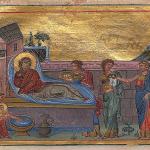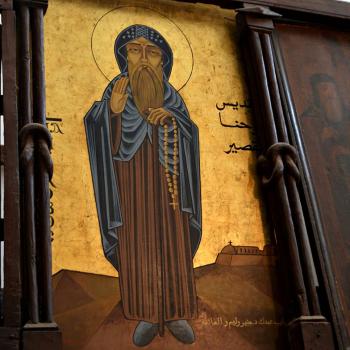
Anger, even if it is justified, is quite powerful, capable of causing us to act without thinking, that is, without wisdom; if we let it guide us, we likely will end up doing something which we will later regret. This is when, even if it is justified, it is something which needs to be tempered, lest we let it distract us from what we should actually be doing. It will have us ignore the greater good by looking at only that which justifies our anger, ignoring the potential we have of harming many innocent people by fulfilling its desires. This is why, even when justified, many saints wanted nothing to do with it; if they felt their ire rise, they would ask God to help them make sure they do not let it blindly influence them, having them act against the way of life they have set out to follow. This is what Abba Zosimas said that Saint Pachomius, the founder of Christian cenobitic monasticism, did:
Abba Zosimas would remember Saint Pachomius, whose elder brother cried out, saying, “Stop being vainglorious.” This was because Pachomius wanted to expand the monastery as a result of the divine vision he was granted. Moreover, as it says, he felt moved to anger, and justifiably so; yet, still he did not say anything in response.[1]
According to the Reflections of Zosimas, Pachomius was justified in his anger. It would appear, by the time his brother questioned his motivation, Pachomius had validated his mission, and so his brother should not have believed Pachomius would fall into vainglory. Pachomius, showing his wisdom, kept silent and did not act on his anger. While his brother should have known better, he also knew, if he responded, if he let his anger get the best of him, he could end up falling for the vainglory which his brother accused him of possessing. Pachomius knew how pride and vainglory easily arises after someone has done something good; he also knew that if he were to defend himself and the good which he wanted to do, he would risk propping himself up so much, he would set up the conditions needed for pride and vainglory to take him over. Nonetheless, Pachomius wanted to respond, wanted to defend himself; he was, after all, quite human, and self-defense is a natural instinct (and when engaged at the proper time and place, can be considered a good, since none of our instincts in and of themselves are evil). It was not easy, even for Pachomius, to let go; he was concerned that his anger would get the best of him, that the instinct for self-preservation, when it was not needed, would lead him to act in haste, and hurt his brother, which is why he went to God in prayer, asking for help:
Instead, remaining in control of his heart, on the following night, he descended into a small basement, and began to weep, praying thus: “God, the fleshly mentality still remains in me, and I still live according to the flesh. Woe is me! For, I shall lose life, as it is written (Rom. 8:12-13). Even after so much ascetic discipline and spiritual preparation, I am still moved to anger; even if it is with good reason. Have mercy on me, Lord, in order that I may not perish. If the enemy finds even the slightest part in me, unless you support me, I shall submit to him. For, ‘if someone keep your whole law, but fails in one point, then that person has become accountable for all of it’ (James 2.10). In addition, I believe that, if your abundant mercies assist me, I shall henceforth learn how to walk in the way of your saints, moving forward to those things which lie before me (Phil. 3.13). For, they appropriately put the enemy to shame. How shall I be able, Lord, to teach those whom you have called with me to choose this way of life, when I have not first conquered the enemy myself?” [2]
Pachomius understood that he had not yet completely become his own master, that various instincts within him were unbalanced, so that if he did not find a way to center himself, the good which he had accomplished could be overturned.
Many people think monasticism, and the asceticism involved, relies too much on the human will, that it represents a spirituality of works. In reality, it is the opposite, as monks (and nuns) discern their weakness, discern how, no matter what they do, no matter what spiritual discipline they engage, their concupiscence remains and continues to tempt them, as the natural instincts of the flesh, when not directed by a rational principle, will lead them to act in ways which counter their greater good. They knew they especially need help from God to establish the proper balance between all the various goods which they have to engage. They know how a simple temptation, a simple, foolish action, can serve as the foundation for their own ruin, which is why they do not rely upon themselves, but rather, like Pachomius, go to God, asking for help and forgiveness for many things, including many of the good things they have which they take for granted. This is exemplified by Pachomius and the prayer have gave: he knew he could not handle his anger and that he needed God’s help, for, if he did not receive it, he would succumb to his anger and the “enemy” (his own unbalanced engagement of the world) would lead him away from the kind of life God set up for him. Thus, as a counter to his anger, but also as a counter to pride and vainglory, he humbled himself before God, asking to be shown the way of the saints and to be given the means by which he could and would walk on it.
We are told Pachomius repeated these words throughout the night, as a result, God gave him the grace which he asked for: “As for me, I am convinced that, during the night, God granted to Pachomius everything for which he had asked, namely to be dead unto all things.”[3] That is, he found himself dead to insults, and many other distractions which would have him stray from the way of life he was set to follow; we must not read this as saying he was dead to God, or the good which he was expected to do in the world.
We might not be like Pachomius, called to be ascetics, but we can and should learn two things from this little event in Pachomius’s life. First, good, holy people, who we can see have had God at work in their lives, remain human, and can and will be affected by what people say and do to them. The second is that temptation will always use some good, take it out of its proper place, and use that good to suggest a course of action which in the end strays from the greater good; thus, Pachomius, it is said, was justified in his anger, but he would not have been justified to act in response to that anger. If he did, he would have acted foolishly, and so, do some sort of evil, even if he intended some good. Similarly, if we try to justify questionable actions because of some good which we see connected with them, we must be careful and make sure we are not justifying evil by embracing a good disconnected from the greater good. For, if we do that, then, no matter what he used to justify our actions, we will ultimately undermine all sense of justice by what we do.
[1] “The Text of the Reflections of Abba Zosimas” in John Chryssavgis, In The Heart Of The Desert. Revised (Bloomington, IN., World Wisdom Inc.: 2008), 125.
[2] “The Text of the Reflections of Abba Zosimas,” 125.
[3] “The Text of the Reflections of Abba Zosimas,” 125.
Stay in touch! Like A Little Bit of Nothing on Facebook.
If you liked what you read, please consider sharing it with your friends and family!
N.B.: While I read comments to moderate them, I rarely respond to them. If I don’t respond to your comment directly, don’t assume I am unthankful for it. I appreciate it. But I want readers to feel free to ask questions, and hopefully, dialogue with each other. I have shared what I wanted to say, though some responses will get a brief reply by me, or, if I find it interesting and something I can engage fully, as the foundation for another post. I have had many posts inspired or improved upon thanks to my readers.













